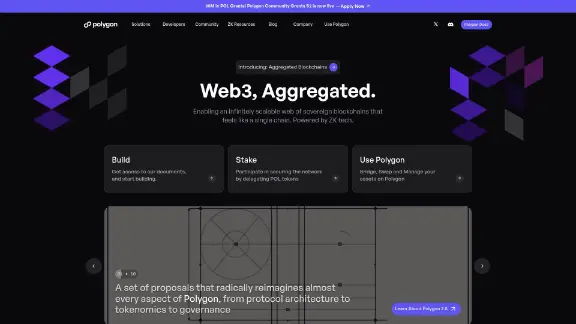Polygon Bridged WBTC (Polygon POS) (WBTC)
Polygon, previously known as Matic Network, is a technology platform that aims to address some of the limitations of the Ethereum blockchain, particularly in terms of scalability, speed, and transaction costs. It achieves this by providing a framework for building and connecting Ethereum-compatible blockchain networks. Polygon is designed to be a "Layer 2" scaling solution, which means it operates on top of the Ethereum blockchain to improve its performance.
History of Polygon
Origins and rebranding

| Ticker | WBTC |
| Category | Polygon Ecosystem |
| Website | https://polygon.technology/ |
| Contract Addresses | |
|---|---|
| polygon-pos | 0x1b...d6 Copied! Copied! |
Polygon was initially launched as Matic Network in 2017 by a team of Indian developers: Jaynti Kanani, Sandeep Nailwal, and Anurag Arjun. The project was designed to provide a scaling solution for Ethereum, which was facing challenges in terms of high transaction costs and slow processing speeds due to its growing popularity. In February 2021, Matic Network rebranded to Polygon in order to expand its scope and become a more comprehensive platform for Ethereum scaling and infrastructure development.
Development and growth
Since its inception, Polygon has seen significant growth and adoption. The platform has been successful in attracting a wide range of decentralized applications (dApps) and projects looking to enhance their performance on the Ethereum blockchain. Polygon's development has been supported by a robust community of developers and a series of strategic partnerships, which have helped to solidify its position as a leading Layer 2 solution.
How Polygon works
Layer 2 scaling solution
Polygon operates as a Layer 2 scaling solution for Ethereum, which means it provides additional infrastructure on top of the base Ethereum layer to improve its performance. This is achieved through a variety of technologies, including Plasma chains, zk-Rollups, and Optimistic Rollups. These technologies enable faster and cheaper transactions by processing them off-chain while maintaining the security and decentralization of the Ethereum mainnet.
Polygon SDK
One of the core components of Polygon is its software development kit (SDK), which allows developers to create custom blockchain networks that are compatible with Ethereum. The Polygon SDK provides a modular framework that supports a variety of scaling solutions and consensus mechanisms, enabling developers to choose the best tools for their specific use cases. This flexibility allows for the creation of a diverse range of applications and services on the Polygon network.
Interoperability and Ethereum compatibility
Polygon is designed to be fully interoperable with the Ethereum blockchain, which means that assets and data can be easily transferred between the two networks. This interoperability is achieved through the use of bridges, which connect Polygon to the Ethereum mainnet and other blockchains. By maintaining compatibility with Ethereum, Polygon allows developers to leverage the security and user base of the Ethereum ecosystem while enjoying enhanced performance.
Applications of Polygon
Decentralized finance (DeFi)
Polygon has become a popular platform for decentralized finance (DeFi) applications, which require fast and cost-effective transactions. By providing a scalable infrastructure, Polygon enables DeFi projects to offer a seamless user experience without the high fees and slow processing times associated with the Ethereum mainnet. This has led to the growth of a vibrant DeFi ecosystem on Polygon, with a wide range of financial services available to users.
Non-fungible tokens (NFTs)
Non-fungible tokens (NFTs) have also found a home on the Polygon network, thanks to its ability to handle large volumes of transactions at low cost. Artists, creators, and developers can mint, buy, and sell NFTs on Polygon without worrying about prohibitive fees. This has contributed to the proliferation of NFT marketplaces and platforms on the network, making it a hub for digital art and collectibles.
Gaming and entertainment
The gaming and entertainment industries have embraced Polygon due to its suitability for high-throughput applications. Game developers can build decentralized games on Polygon that offer fast, interactive experiences for players. Additionally, Polygon's infrastructure supports the creation and management of in-game assets and currencies, enabling new business models and monetization strategies in the gaming world.
